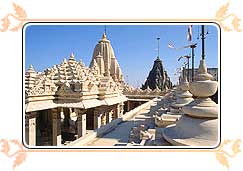JAINISM
Jainism was born in
India about the same period as Buddhism. It was established by Mahavira in about
500 B. C. Mahavira like Buddha belonged to the warrior caste. Mahavira was
called ĎJinaí meaning the big winner and from this name was derived the name of
the religion. In many senses Jainism is similar to Buddhism. Jainism like
Buddhism, developed as a dissention to the Brahmanic philosophy that was
dominant during that period in north- east India. Mahavira just like Buddha
isnít the first prophet of his religion. In Jainism like Buddhism there is a
belief in reincarnation which eventually leads to liberation. Both these
religions donít center in religious philosophy around Almighty worship. But
Jainism is different than Buddhism in its ascetic beliefs. Both these religions
emphasis on non-violence, but in Jainism non-violence is its main core. Jains
believe that every thing has life and this also includes stones, sand, trees and
every other thing. The fact that trees breath came to be known to the science
world only from the 20th century. Mahavira who believed that every thing has
life and also believed in non-violence practically didnít eat anything causing
his self- starvation to death. Mahavira was also extremely ascetic and walked
around completely naked because of his renouncement of life. Mahaviraís religion
followers are less extreme than him in diets. They are vegetarians. But the
religious Jains will do everything possible to prevent hurting any being. They
wonít walk in fields where there are insects to prevent the possibility of
stepping on them. They also cover their mouth to prevent the possibility of
swallowing small invisible microbes. They mostly do not work in professions
where there is a possibility of killing any living being like in agriculture
instead professions like banking and business. But it is not clear what came
first, businessmen who adopted Jain philosophy because it was easy for them to
follow or Jainish philosophy which convinced the Jains to adopt non violent
professions.
Jainism non-violence is its main core. Jains
believe that every thing has life and this also includes stones, sand, trees and
every other thing. The fact that trees breath came to be known to the science
world only from the 20th century. Mahavira who believed that every thing has
life and also believed in non-violence practically didnít eat anything causing
his self- starvation to death. Mahavira was also extremely ascetic and walked
around completely naked because of his renouncement of life. Mahaviraís religion
followers are less extreme than him in diets. They are vegetarians. But the
religious Jains will do everything possible to prevent hurting any being. They
wonít walk in fields where there are insects to prevent the possibility of
stepping on them. They also cover their mouth to prevent the possibility of
swallowing small invisible microbes. They mostly do not work in professions
where there is a possibility of killing any living being like in agriculture
instead professions like banking and business. But it is not clear what came
first, businessmen who adopted Jain philosophy because it was easy for them to
follow or Jainish philosophy which convinced the Jains to adopt non violent
professions.
There are two Jain
philosophies. Shvetember and Digamber. Digamber monks like Mahavira donít wear
any clothes, but normally they donít walk like that outside their temples. The
Digambers include among them only men. The Shvetembers monks wear white clothes
and they include women.
 Jainism non-violence is its main core. Jains
believe that every thing has life and this also includes stones, sand, trees and
every other thing. The fact that trees breath came to be known to the science
world only from the 20th century. Mahavira who believed that every thing has
life and also believed in non-violence practically didnít eat anything causing
his self- starvation to death. Mahavira was also extremely ascetic and walked
around completely naked because of his renouncement of life. Mahaviraís religion
followers are less extreme than him in diets. They are vegetarians. But the
religious Jains will do everything possible to prevent hurting any being. They
wonít walk in fields where there are insects to prevent the possibility of
stepping on them. They also cover their mouth to prevent the possibility of
swallowing small invisible microbes. They mostly do not work in professions
where there is a possibility of killing any living being like in agriculture
instead professions like banking and business. But it is not clear what came
first, businessmen who adopted Jain philosophy because it was easy for them to
follow or Jainish philosophy which convinced the Jains to adopt non violent
professions.
Jainism non-violence is its main core. Jains
believe that every thing has life and this also includes stones, sand, trees and
every other thing. The fact that trees breath came to be known to the science
world only from the 20th century. Mahavira who believed that every thing has
life and also believed in non-violence practically didnít eat anything causing
his self- starvation to death. Mahavira was also extremely ascetic and walked
around completely naked because of his renouncement of life. Mahaviraís religion
followers are less extreme than him in diets. They are vegetarians. But the
religious Jains will do everything possible to prevent hurting any being. They
wonít walk in fields where there are insects to prevent the possibility of
stepping on them. They also cover their mouth to prevent the possibility of
swallowing small invisible microbes. They mostly do not work in professions
where there is a possibility of killing any living being like in agriculture
instead professions like banking and business. But it is not clear what came
first, businessmen who adopted Jain philosophy because it was easy for them to
follow or Jainish philosophy which convinced the Jains to adopt non violent
professions.